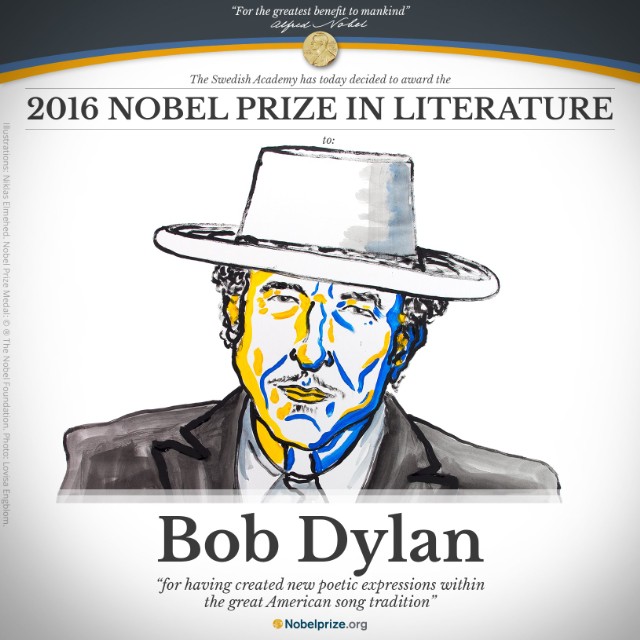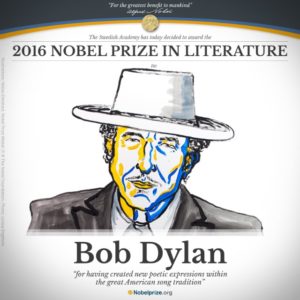The singer and songwriter Bob Dylan was awarded the Nobel Prize in Literature for “having created new poetic expressions within the great American song tradition,” in the words of the Swedish Academy.
About Bob Dylan,
Bob Dylan is an American singer-songwriter, artist and writer. He has been influential in popular music and culture for more than five decades. Much of his most celebrated work dates from the 1960s when his songs chronicled social unrest, although Dylan repudiated suggestions from journalists that he was a spokesman for his generation.
- Nevertheless, early songs such as “Blow in the Wind” and “The Times They Are a-Changing’“ became anthems for the American civil rights and anti-war Leaving behind his initial base in the American folk music revival, his six-minute single “Like a Rolling Stone”, recorded in 1965, enlarged the range of popular music.

- Dylan’s mid-1960s recordings, backed by rock musicians, reached the top end of the United States music charts while also attracting denunciation and criticism from others in the folk movement.
- Dylan’s lyrics have incorporated various political, social, philosophical, and literary influences. They defied existing pop music conventions and appealed to the burgeoning counter culture.
- Initially inspired by the performances of Little Richard and the songwriting of Woody Guthrie, Robert Johnson, and Hank Williams, Dylan has amplified and personalized musical genres.
- His recording career, spanning more than 50 years, has explored the traditions in American song—from folk, blues, and country to gospel, rock and roll, and rockabilly to English, Scottish, and Irish folk music, embracing even jazz and the Great American Songbook. Dylan performs with guitar, keyboards, and harmonica.
- Backed by a changing lineup of musicians, he has toured steadily since the late 1980s on what has been dubbed the Never Ending Tour. His accomplishments as a recording artist and performer have been central to his career, but songwriting is considered his greatest contribution.
- Since 1994, Dylan has published six books of drawings and paintings, and his work has been exhibited in major art galleries. As a musician, Dylan has sold more than 100 million records, making him one of the best-selling artists of all time.
- He has also received numerous awards including eleven Grammy Awards, a Golden Globe Award, and an Academy Award. Dylan has been inducted into the Rock and Roll Hall of Fame, Minnesota Music Hall of Fame, Nashville Songwriters Hall of Fame, and Songwriters Hall of Fame.
- The Pulitzer Prize jury in 2008 awarded him a special citation for “his profound impact on popular music and American culture, marked by lyrical compositions of extraordinary poetic power.” In May 2012, Dylan received the Presidential Medal of Freedom from President Barack Obama.
- In 2016, Dylan received the Nobel Prize in Literature, “for having created new poetic expressions within the great American song tradition”.
About Nobel Prize in Literature,
Since 1901, the Nobel Prize in Literature has been awarded annually to an author from any country who has, in the words of the will of Alfred Nobel, produced “in the field of literature the most outstanding work in an ideal direction.”
- Though individual works are sometimes cited as being particularly noteworthy, here “work” refers to an author’s work as a whole. The Swedish Academy decides who, if anyone, will receive the prize in any given year.
- The academy announces the name of the chosen laureate in early October. It is one of the five Nobel Prizes established by the will of Alfred Nobel in 1895; the others are the Nobel Prize in Chemistry, Nobel Prize in Physics, Nobel Peace Prize, and Nobel Prize in Physiology or Medicine.
- Nobel’s choice of emphasis on idealism in his criteria for the Nobel Prize in Literature has led to recurrent controversy. In the original Swedish, the word idealisk translates as either “idealistic” or “ideal”.
- In the early twentieth century, the Nobel Committee interpreted the intent of the will strictly. For this reason, they did not award certain world-renowned authors of the time such as James Joyce,Leo Tolstoy, Anton Chekhov, Marcel Proust, Henrik Ibsen, and Henry James. More recently, the wording has been more liberally interpreted.
- Thus, the prize is now awarded both for lasting literary merit and for evidence of consistent idealism on some significant level. In recent years, this means a kind of idealism championing human rights on a broad scale. Hence, the award is now arguably more political.
- The Swedish Academy has attracted significant criticism in recent years for its handling of the award. Some critics contend that many well-known writers have not been awarded the prize or even been nominated and others contend that some well-known recipients do not deserve it.
- There have also been controversies involving alleged political interests relating to the nomination process and ultimate selection of some of the recent literary laureates.






